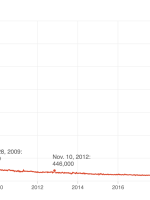Updated at 9:27 a.m. ET
Job growth picked up for the 100th consecutive month in January even as hundreds of thousands of federal workers were furloughed during the partial government shutdown, the Labor Department said Friday.
Employers added 304,000 jobs last month — topping analysts' expectations and the 223,000 average monthly gain in 2018. The string of job growth underscores the long economic expansion since the Great Recession.
The unemployment rate inched up to 4 percent, and the shutdown contributed to the uptick, the department said.
Don't see the graphic above? Click here
Private economists had expected an increase of about 170,000 jobs and the unemployment rate to be unchanged at 3.9 percent.
In December, the economy added a revised 222,000 jobs. That was less than the blockbuster 312,000 first reported, and it followed the revised 176,000 jobs added in November.
Gains occurred in a number of sectors: Leisure and hospitality added 74,000 jobs, construction 52,000, health care 42,000, retail nearly 21,000 and manufacturing 13,000.
Wage growth held steady in January. Average hourly earnings grew 3.2 percent over the past 12 months — matching December's increase. Workers earned an average of $27.56 an hour last month.
The 35-day partial government shutdown, which ended Jan. 25, affected hundreds of thousands of federal workers and contractors. But because of a bill signed into law by President Trump on Jan. 16, federal employees who were furloughed or required to work without pay were guaranteed back pay after the shutdown ended. Those workers were counted as employed, the Bureau of Labor Statistics said.
Still, the Labor Department said that the number of people employed part time who wanted to work full time jumped by about 500,000, to 5.1 million, in January. "Nearly all of this increase occurred in the private sector and may reflect the impact of the partial federal government shutdown," it said.
The Congressional Budget Office estimates the shutdown will cut economic growth by 0.4 percentage points in the first quarter of 2019, although some of that will be recouped later in the year.
The Federal Reserve, which keeps a close eye on the employment numbers, said Wednesday that the labor market has continued to strengthen since December. The central bank, which raised rates four times last year, did not raise rates and cited "global economic and financial developments" and low U.S. inflation as reasons to be patient before changing rates again.
"The respectable employment data provides something of a relief, for now at least, for members of the Federal Reserve who have been bracing for the possibility of a more serious slowdown in the U.S. economy," said Mark Hamrick, a senior economic analyst at Bankrate.com.
Copyright 2020 NPR. To see more, visit https://www.npr.org.



